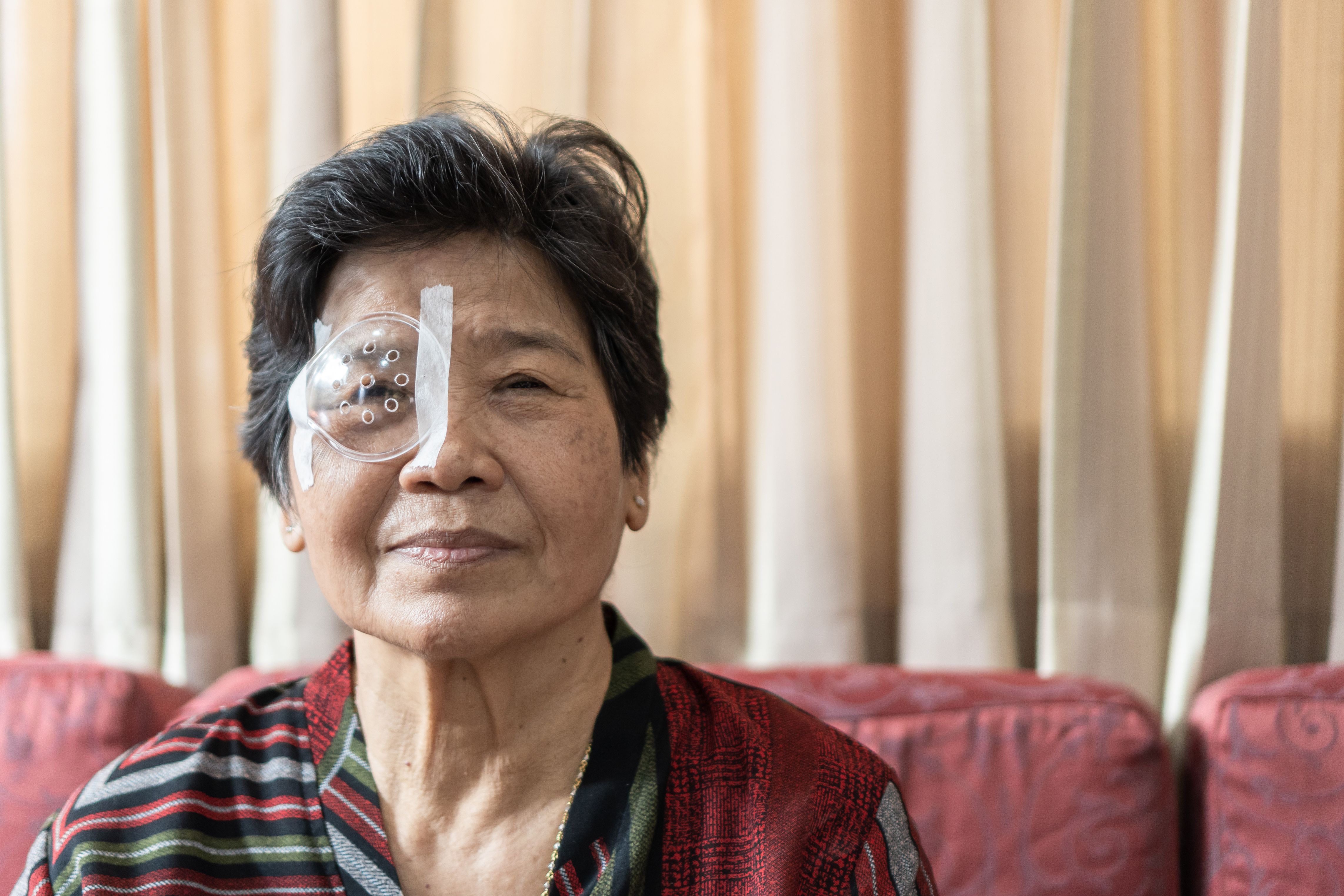- Bone Health
- Immunology
- Hematology
- Respiratory
- Dermatology
- Diabetes
- Gastroenterology
- Neurology
- Oncology
- Ophthalmology
- Rare Disease
- Rheumatology
QL1207 Biosimilar Shows Equivalent Efficacy, Safety to Aflibercept in Treating nAMD
A Chinese phase 3 trial found biosimilar QL1207 to be as effective and safe as reference aflibercept (Eylea) for the treatment of neovascular age-related macular degeneration (nAMD).
Elder Asian woman with eye care treatment | Image Credit: Chinnapong - stock.adobe.com

Patients with neovascular age-related macular degeneration (nAMD) demonstrated comparable efficacy, safety, immunogenicity, and pharmacokinetics (PK) between reference aflibercept (Eylea) and QL1207, an aflibercept biosimilar.
The randomized, double-blind, phase 3 trial was conducted across 35 centers in China. Patients were screened from August 2019 to January 2022, and randomized to receive either 2 mg reference aflibercept or QL1207 intravitreally every 4 weeks for the first 3 months followed by 2 mg every 8 weeks until week 48. The phase 3 trial included participants 50 years or older who were blind to allocation along with assessors.
Out of 533 patients screened, a total of 366 were enrolled and assigned (reference group, n = 181; QL1207 group, n = 185). All 366 patients with nAMD were included in the full analysis set (FAS), while the per-protocol set (PPS) had 319 patients (aflibercept, n = 159; QL1207, n = 160). The FAS included patients who received at least 1 dose of the study drug and 1 efficacy assessment, and the PPS included patients in the FAS without any major protocol violations. The final analysis contained data on 321 patients, with 155 receiving reference aflibercept and 166 in the QL1207 group.
Results found the reference aflibercept group had an average (SD) age of 67.1 (8) years while QL1207 had an average of 67.4 (8.9) years. The average best-corrected visual acuity (BCVA) was 56.1 (11.7) letters vs 56.3 (11.8) letters, with 80% and 80.7% patients having a score of 45 letters or more. The mean central retinal thickness area was 428.2 (178.1) mm vs 463.5 (193.3) mm while average choroidal neovascularization (CNV) leakage areas were 3.99 (4.14) vs 3.99 (4.13) mm2.
On average, the BCVA changes in the FAS from baseline at week 12 were 11 (9.2) letters in the reference aflibercept group and 10.2 (8.8) letters in the QL1207 group. The least-squares mean (LSM) changes in BCVA were 10.4 letters vs 11.5 letters from baseline to week 12 with a difference of –1.1 letters. No significant differences were found among the primary endpoints in either group. Patients with a BCVA score greater than or equal to 45 letters had a –1 LSM difference while patients with less than 45 letters had a difference of –1.6 LSM at baseline. At week 12, the LSM remained within the equivalence margin.
From baseline to week 52, LSM changes were –183 mm vs –208.4 mm, with a 25.4 mm difference in LSM. At week 52, LSM changes in CNV leakage area were –2.72 vs –2.61 LSM with a corresponding difference of –0.11 mm2. Similarities at other timepoints were similar in the 2 groups as well.
Safety among the reference aflibercept and QL1207 groups had comparable incidences of treatment-emergent adverse events (TEAE; 71.8% vs 71.4%, respectively). Similar ocular (29.8% vs 28.1%), fellow eyes (13.8% vs 19.5%), and non-ocular TEAEs (56.9% vs 60%) were reported in the reference aflibercept and QL1207 groups, respectively. Intraocular pressure increased (13.3% vs 11.9%), conjunctival hemorrhage (6.1% vs 5.9%), eye pain (1.7% vs 2.7%), ocular hypertension (1.1% vs 2.2%), cataract (1.7% vs. 1.6%), and conjunctivitis (1.7% vs. 1.6%) were the most common TEAEs among the aflibercept and QL1207 groups, respectively. Neither group had TEAEs leading to death, but 4 patients in the reference aflibercept group and 2 patients in the QL1207 group discontinued treatment due to related TEAEs.
The immunogenicity and PK analysis included 365 patients with similar incidences of positive antidrug antibodies (ADAs) between reference aflibercept and QL1207 (7.7% vs 7.1%). Both groups had comparable plasma drug concentrations and PK parameters as well as similar vascular endothelial growth factor levels as well.
The study was limited to only Chinese patients which arises caution when considering these results for other ethnicities. The optical coherence tomography angiography was not implemented for the CNV assessment due to its lack of validation during study design in the clinical trial setting.
Authors concluded with their supported evidence of QL1207 as an alternative option to the originator when treating patients with nAMD in China.
Reference
Li B, Fan K, Zhang T, et al. Efficacy and safety of biosimilar QL1207 vs. the reference aflibercept for patients with neovascular age-related macular degeneration: A randomized phase 3 trial. Ophthalmol Ther. 2024;(13):353-366. doi:10.1007/s40123-023-00836-4
Insights from Festival of Biologics: Dracey Poore Discusses Cardinal Health’s 2024 Biosimilar Report
May 19th 2024The discussion highlights key emerging trends from the Festival of Biologics conference and the annual Cardinal Health Biosimilars Report, including the importance of sustainability in the health care landscape and the challenges and successes in biosimilar adoption and affordability.
Exploring the Biosimilar Horizon: Julie Reed's Predictions for 2024
February 18th 2024On this episode of Not So Different, Julie Reed, executive director of the Biosimilars Forum, returns to discuss her predictions for the biosimilar industry for 2024 and beyond as well as the impact that the Forum's 4 new members will have on the organization's mission.
